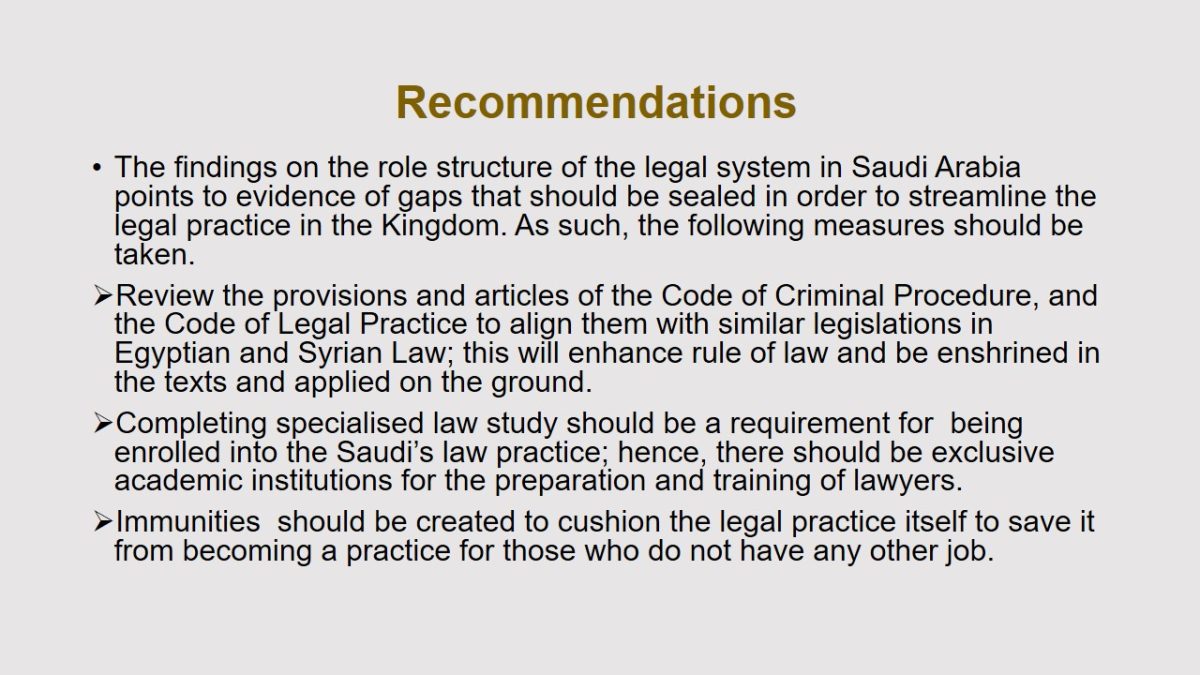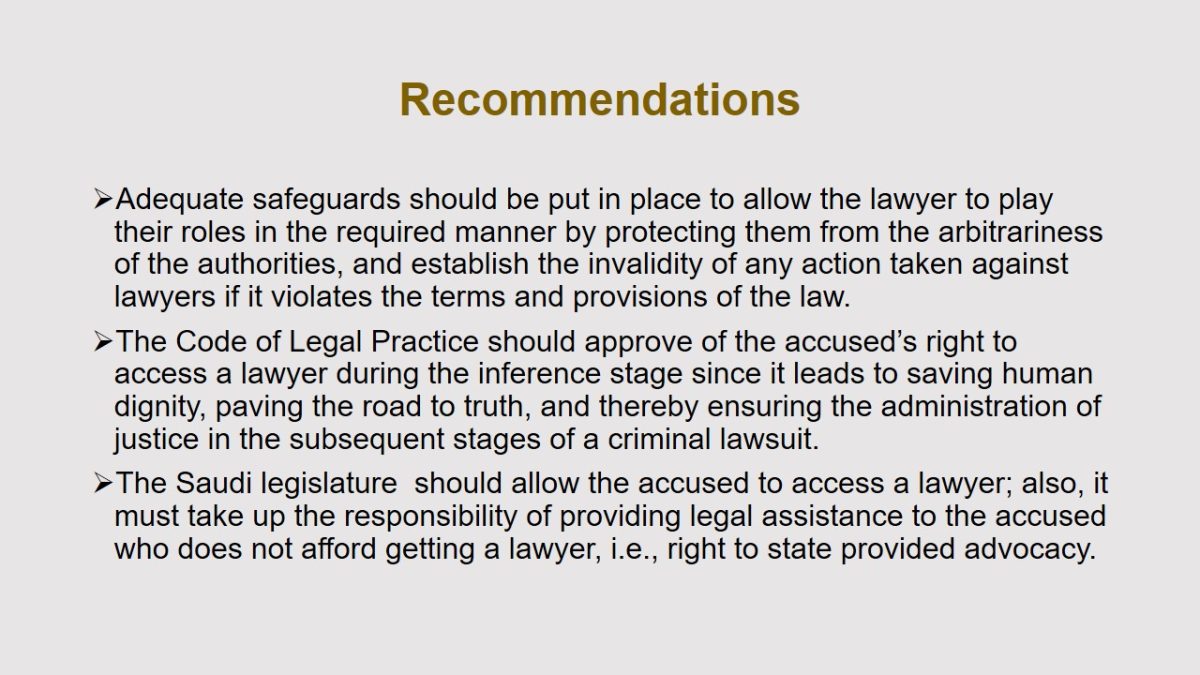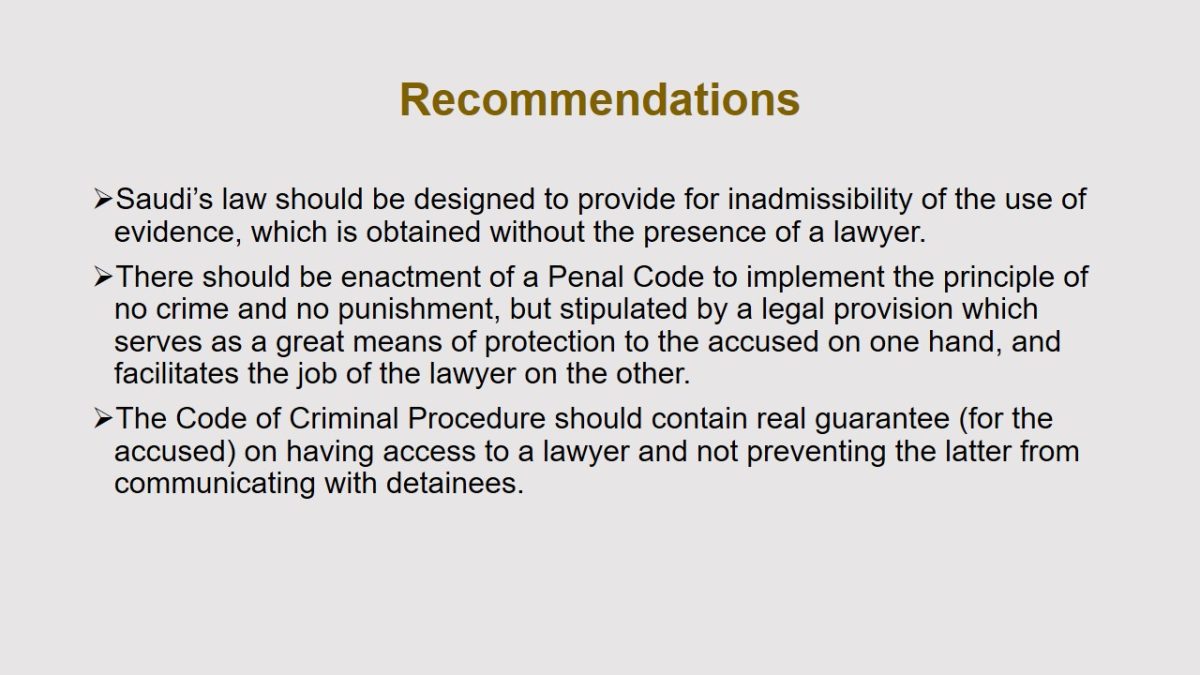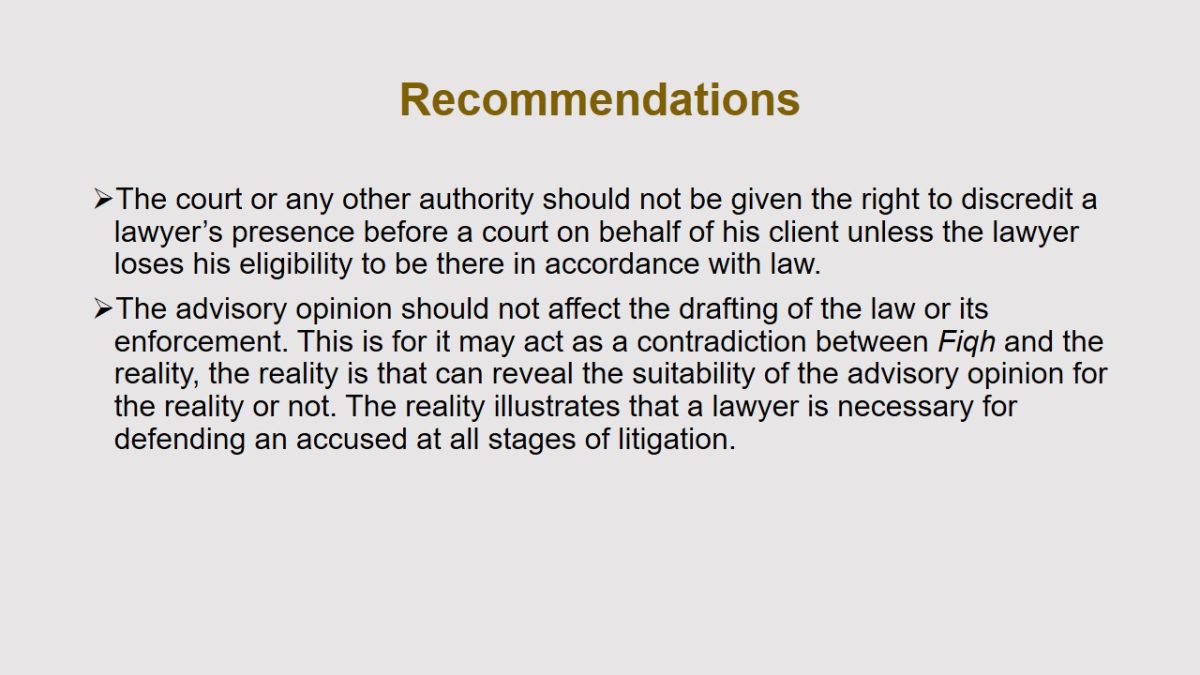Introduction
For a long time, legal practice in Saudi Arabia has not been fully operational despite the issuance of an act that allowed the practice in 2001 A.D. The suppressed state of law then was the prevailing Islamic legal practice , which did not accept lawyers job.
Litigation is a crucial practice in legal practice. Any society has set measures that define how a legal practice takes place in relation to the key players, i.e., the court, plaintiff and the defendant. In an organized society, customs, traditions and other adopted practices determine the modus operandi of legal practices. In essence it outlines the attorney’s nature of power and litigation process in a specified jurisdiction.
The nature of the legal system in a country influences the basic fundamental human rights that citizens enjoy. For example, in democratic countries freedom of hearing is of paramount importance.
The freedom of hearing denotes the involvement of lawyers in the litigation process. However, there are countries where professional practice of lawyers remains to be an illusion to date. This implies that litigants have no legal representations from lawyers in such countries.
Lawyers play an important role in standing in to fill the gap where the litigants cannot express themselves adequately due to the complex nature of law or due to other issues that limit the person from representing himself or herself.
The aim of lawyers is not to subvert the course of justice; instead, lawyers are professionals who champion for the need for their clients to achieve justice in courts of law. Due to the significance of the lawyers in promotion of justice, many countries across the globe have enacted laws that guide the practice of law.
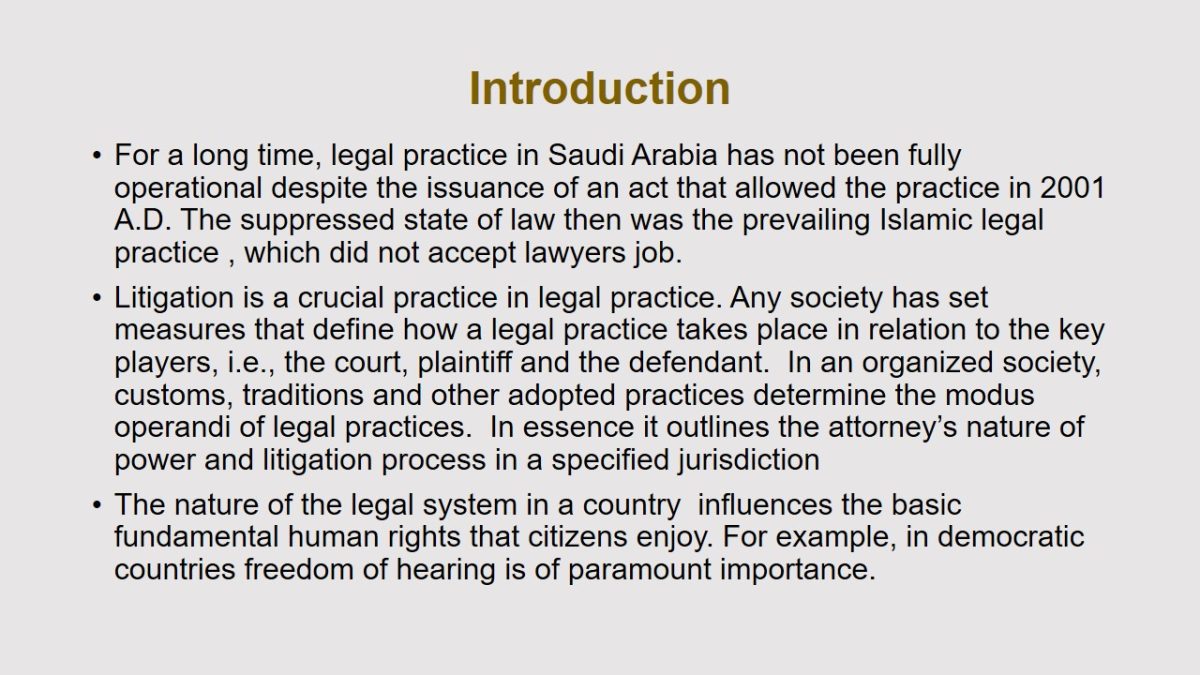
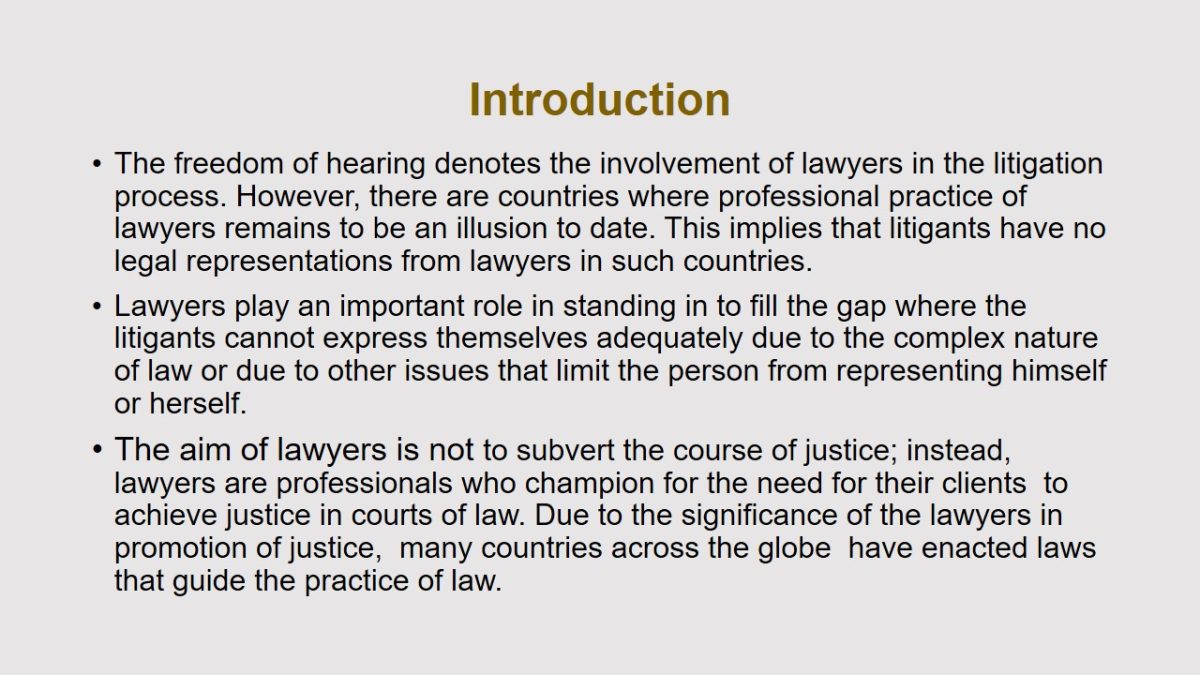
Literature Review
Research on the Saudi laws in relation to legal representation and roles of lawyers in litigations is a thorny issue.
The issue is thorny due to lack of studies that analyse the importance of the law in Saudi Arabia.
The bulk of literature available on the issue at hand deals with legal representation at organisational level.
There is evidence of lack of the vision of the legislator in the enactment of the law that encompasses other legal systems in the Saudi law.
This implies that the scarcity of references on Saudi law resulted in real difficulty in obtaining the relevant information on the position of legal representation within the legal system of Saudi Arabia.
Thus, the present endeavour is the first critical and analytical study of legislation in Saudi Arabia regarding the practice of law on the part of lawyers.
Research on legal representation in Saudi Arabian law is limited. Those that do address the matter are reviewed below:
- Disciplinary action in saudi law;
- The responsibility of lawyer (Disciplinary, civil and criminal) In Shari’ah and the saudi code of legal practice;
- The legal profession in the light of islamic law and arab laws;
- Access to a lawyer at the inference stage;
- The code of legal practice in islamic jurisprudence and its applications in Saudi Arabia;
- The code of legal practices history in the systems and the position of islamic lawLawyer’s rights and duties in the common code of legal practice of gulf cooperation council (Gcc): A study comparing with the saudi code of legal practice;
- Fair trial in islamic penal system and international conventions;
- The code of legal practice in islamic jurisprudence and law;
- The legal profession in islamic jurisprudence and the saudi law and its role in achieving justice;
- Ethics for agents of litigation and their impact on justice;
- Provisions of the saudi code of legal practice.
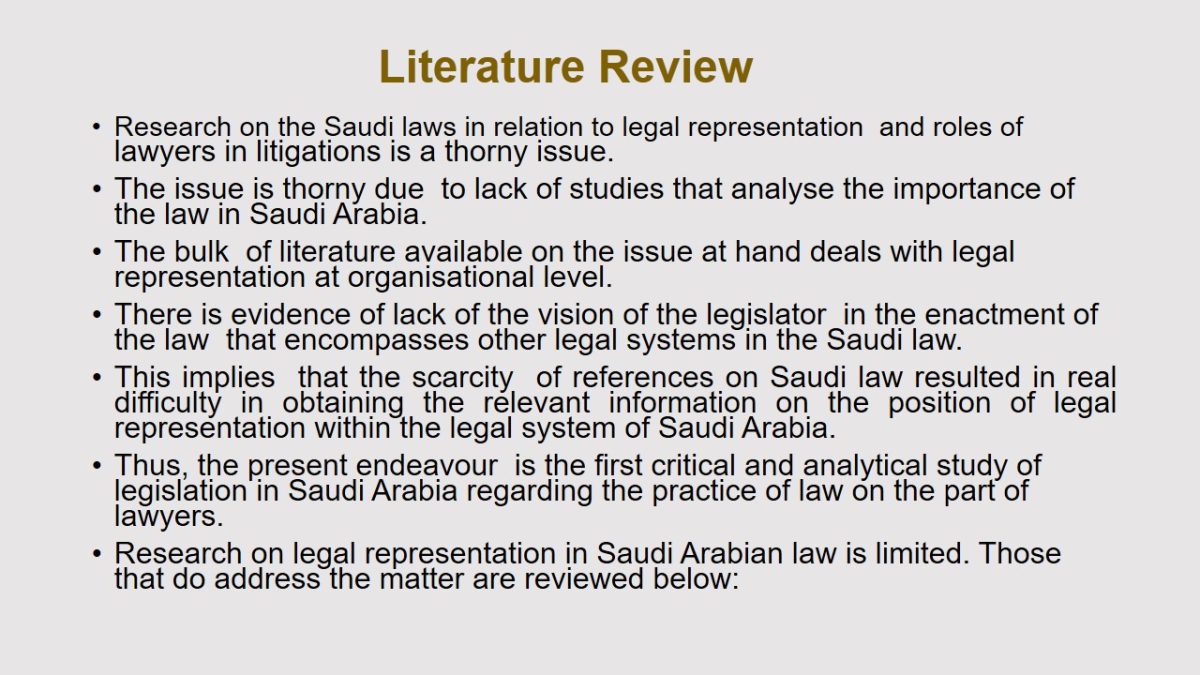
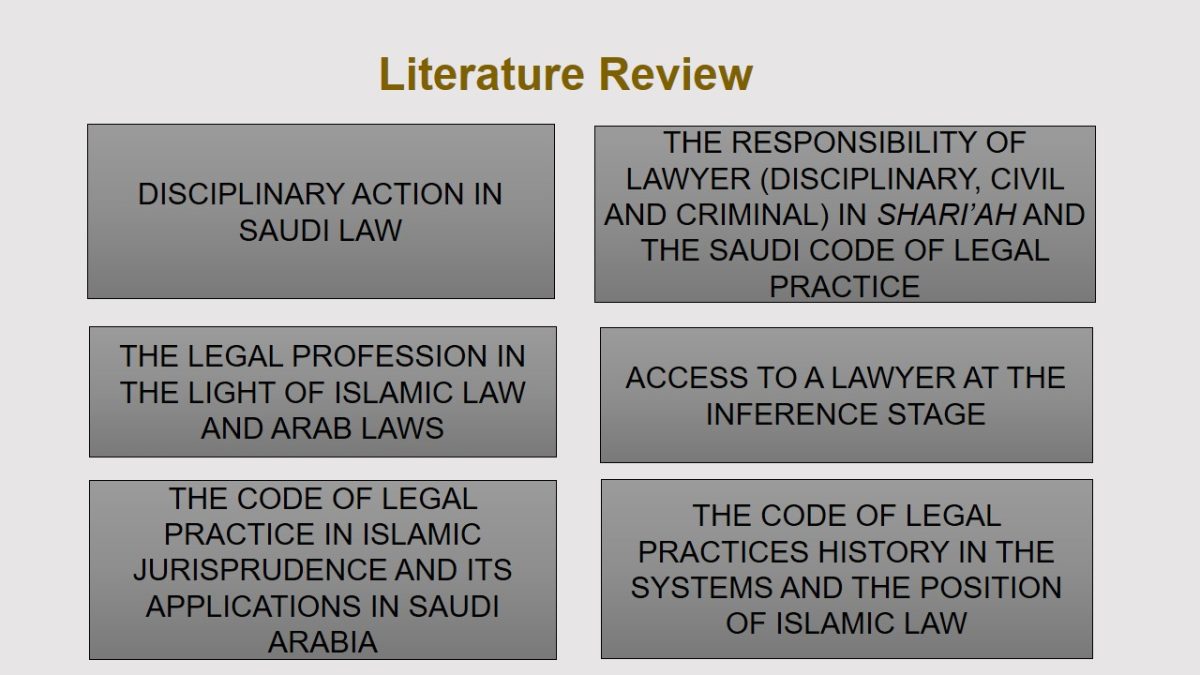
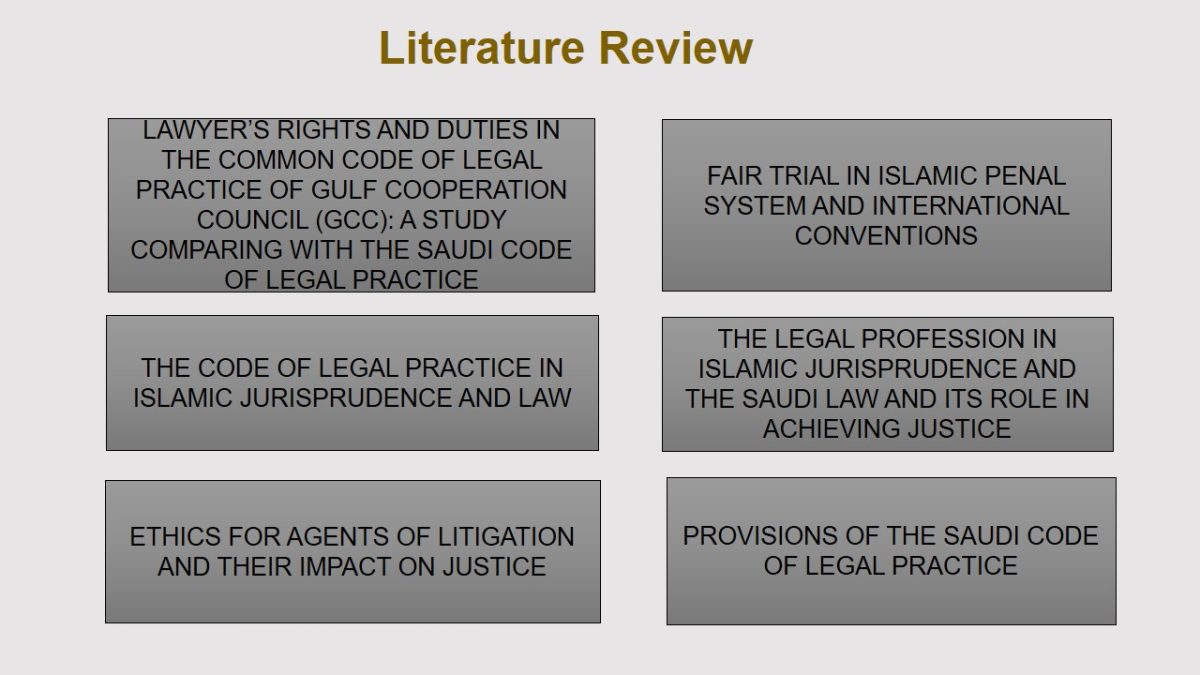
Problem Statement
- There are extensive violations of the law at all stages of criminal cases.
- Also, the practice and treatment of the legal provisions that reveal the nature of the legal application; however, the practice point out to the non-binding nature of the legal provisions.
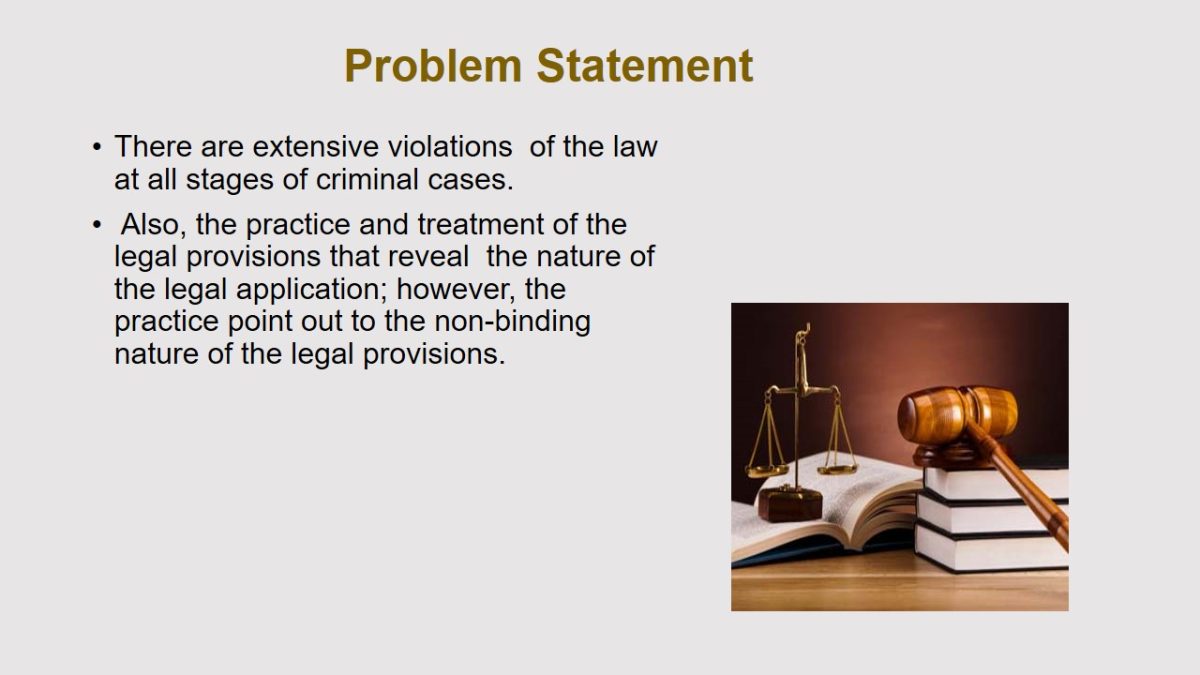
Research Objectives
- To find out the extent of legitimacy of professional legal representation in the Islamic law.
- To clarify the need for legal representation at all stages of criminal cases.
- To carry out a critical analysis on the articles that restrict the access of the accused to a lawyer in the Kingdom of Saudi Arabia.
- To carry out a disclosure of the practical reality about legal representation in a criminal case.
- To suggest the adoption of a Code of Legal Practice in line with SharÊ’ah, as it is in Egyptian and Syrian law. The two jurisdictions’ laws may serve as model legal framework for the professional legal practice in the Kingdom of Saudi Arabia.
- To explore the extent of commitment shown by investigating authorities and the court to the provisions of the law.
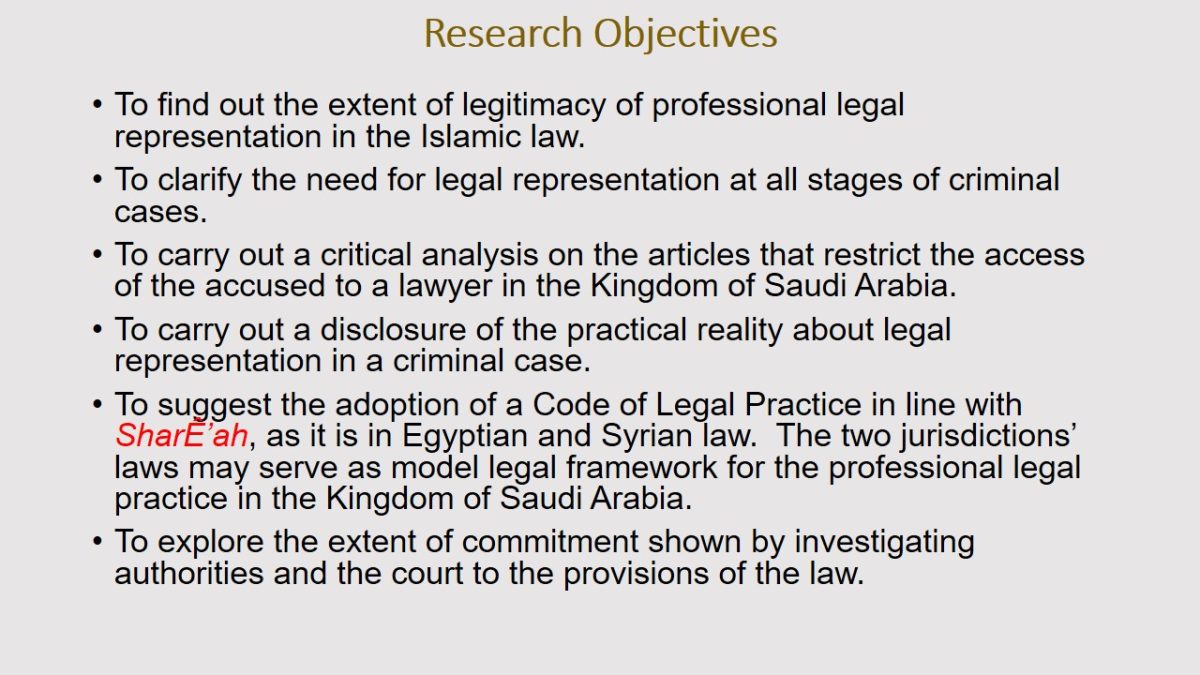
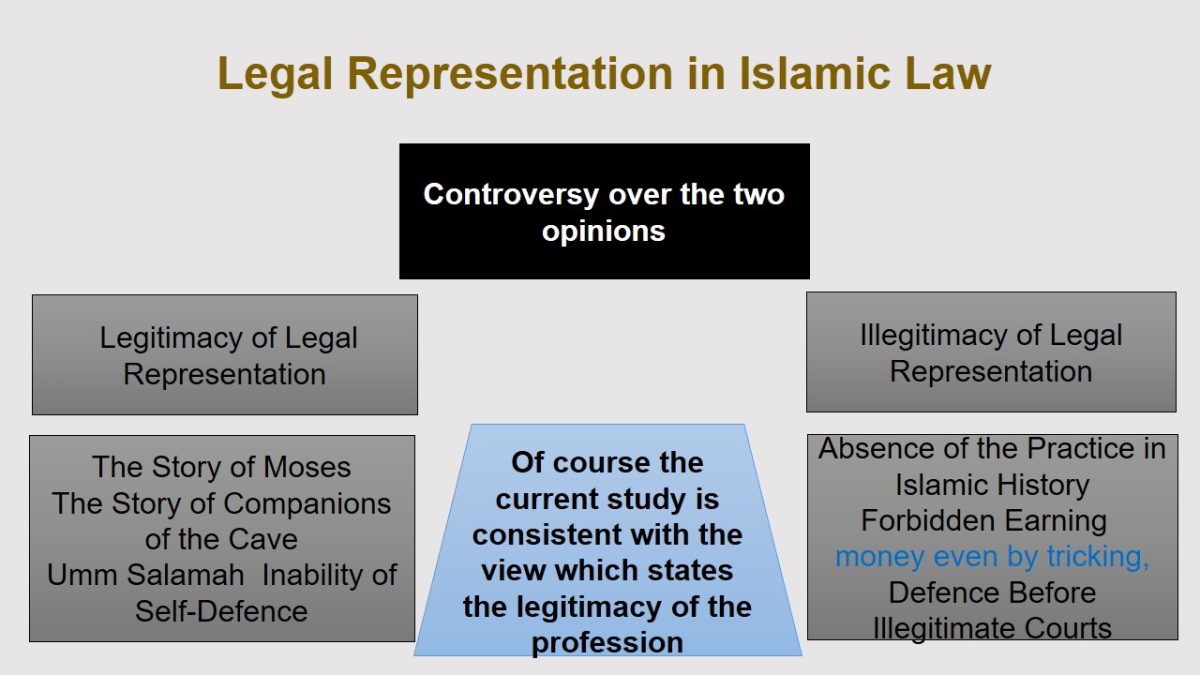
Legal Regulation for Saudi Legal Profession
- The Rights of Lawyers.
- Conditions for Legal Practice.
- Duties of a Lawyer.
The current study has established that the requirements as provided under other legislations are almost similar to the requirements or conditions as contained in Saudi Code of Legal Practice. However, Saudi law requires an individual who wants to join the legal practice to have a qualification in Islamic Law with first class or its equivalent. This is the greatest and most noticeable difference, which is not common in other legislations.
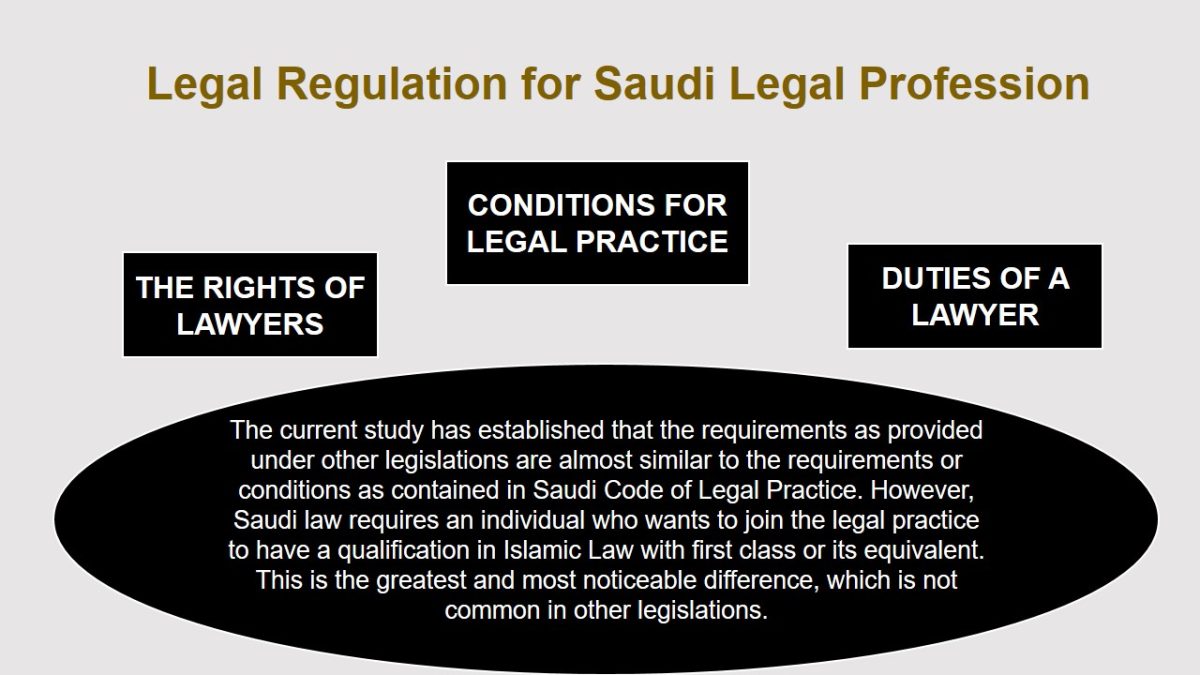
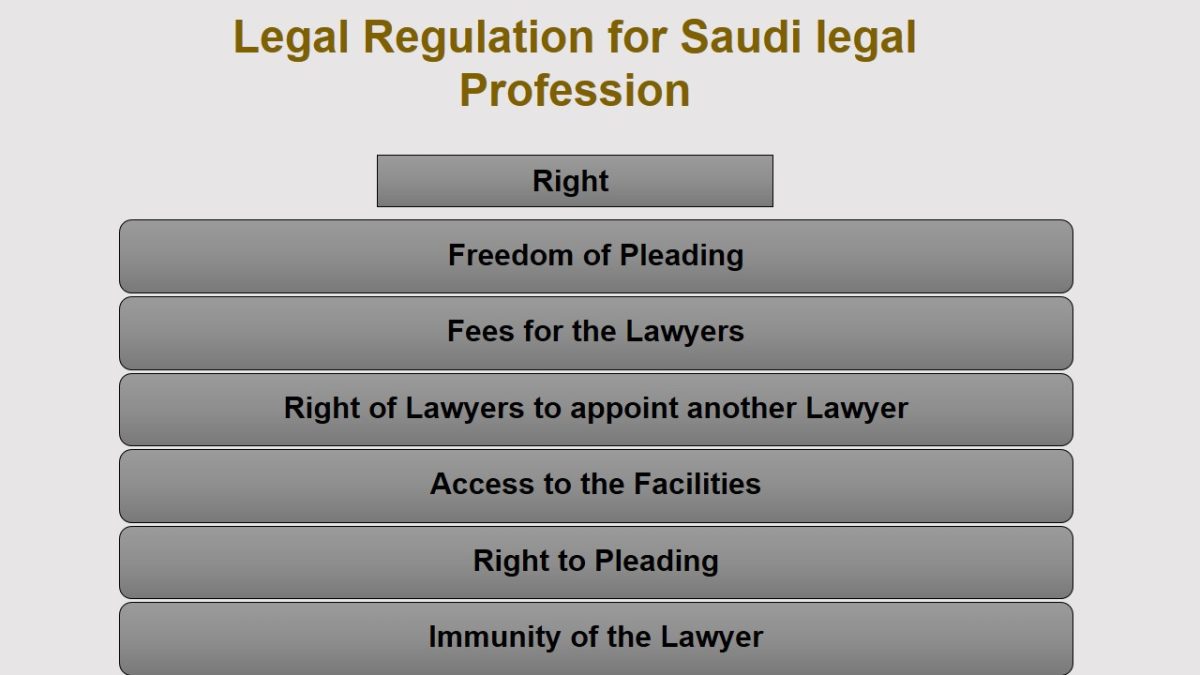
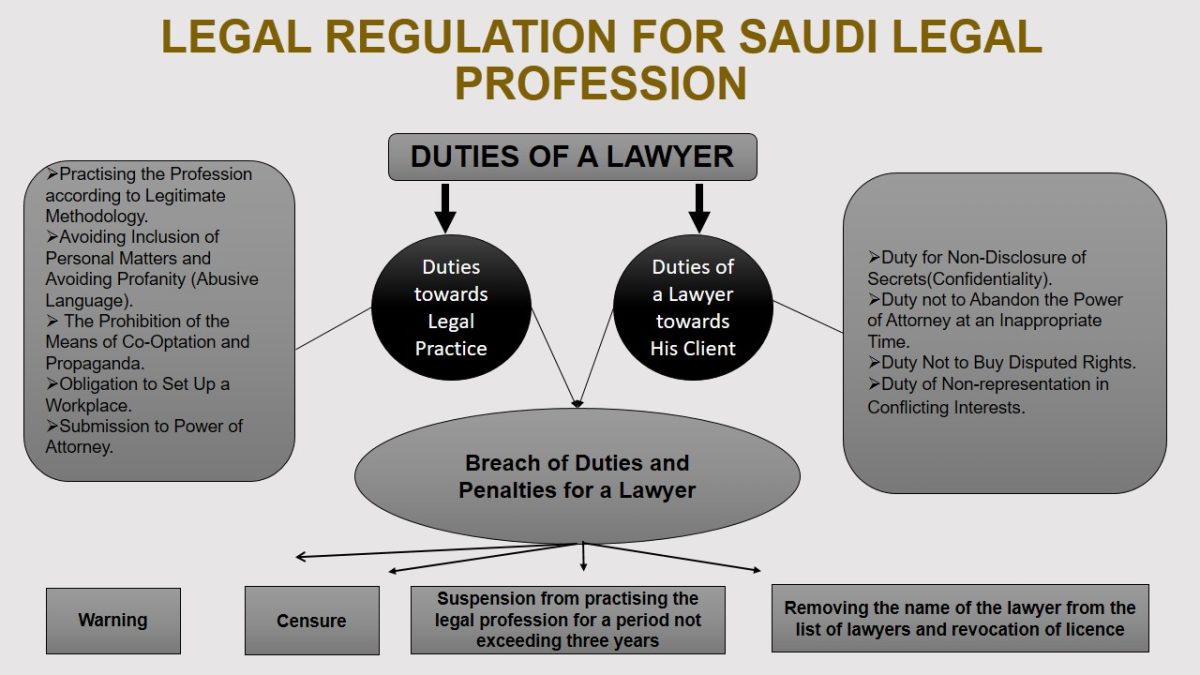
Legal Representation in Saudi Criminal Cases
- Inference:
- Presence of a Lawyer:
- Laws Acknowledging the Presence of the Lawyer.
- Jurists’ Views of the Lawyer’s Role During Inference.
- Presence of a Lawyer:
- H1: Adherence to the Prescribed Period of Detention.
- H2: Preserving the Dignity of the Accused.
- H3: Equitable Conduction of Investigation.
- H4: Respecting the Dignity and Privacy of the Accused.
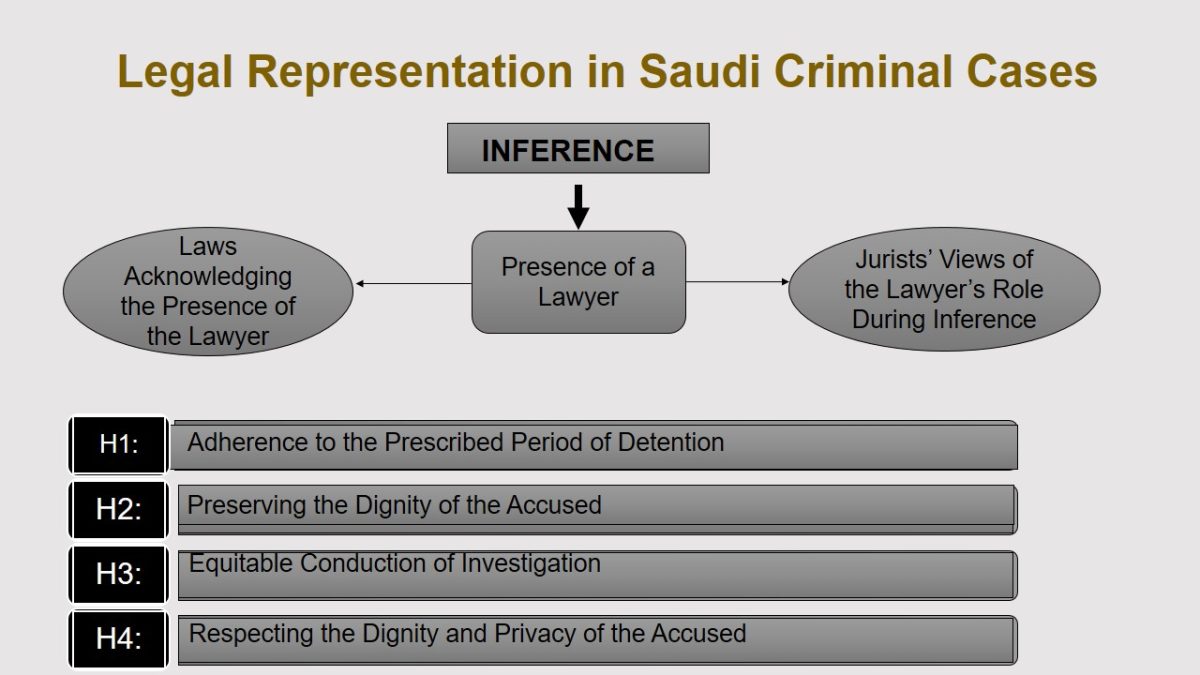
- Preliminary Investigation:
- The Procedural Safeguards During Preliminary Investigation:
- The Lawyer’s Contact with and Visit to the Accused;
- Access to the Case File and Making its Copies;
- Inviting the Lawyer to Attend the Investigation Procedures;
- Lawyer’s Presence during the Procedures of Interrogation.
- The Procedural Safeguards During Preliminary Investigation:
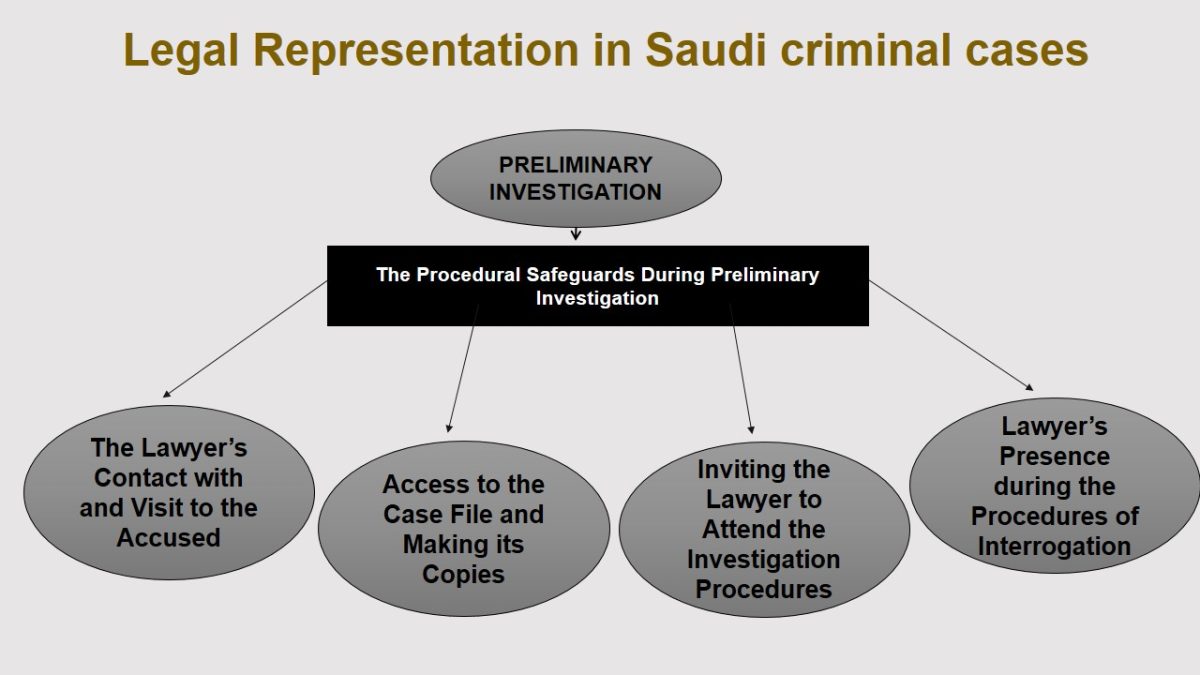
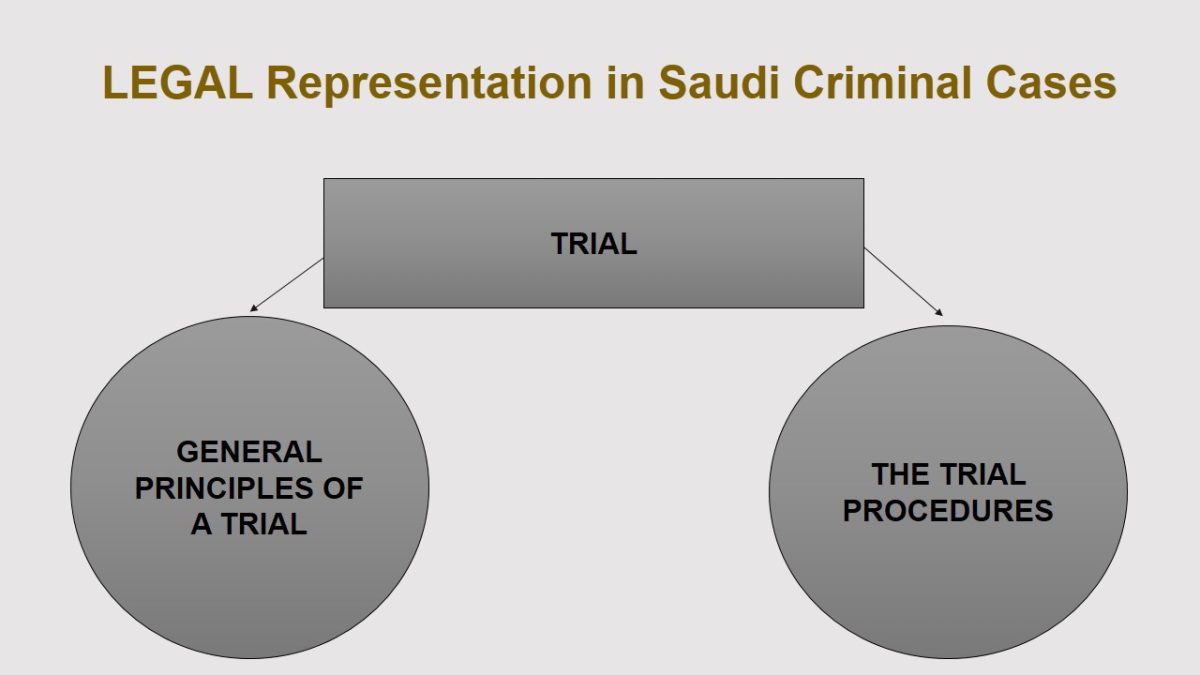
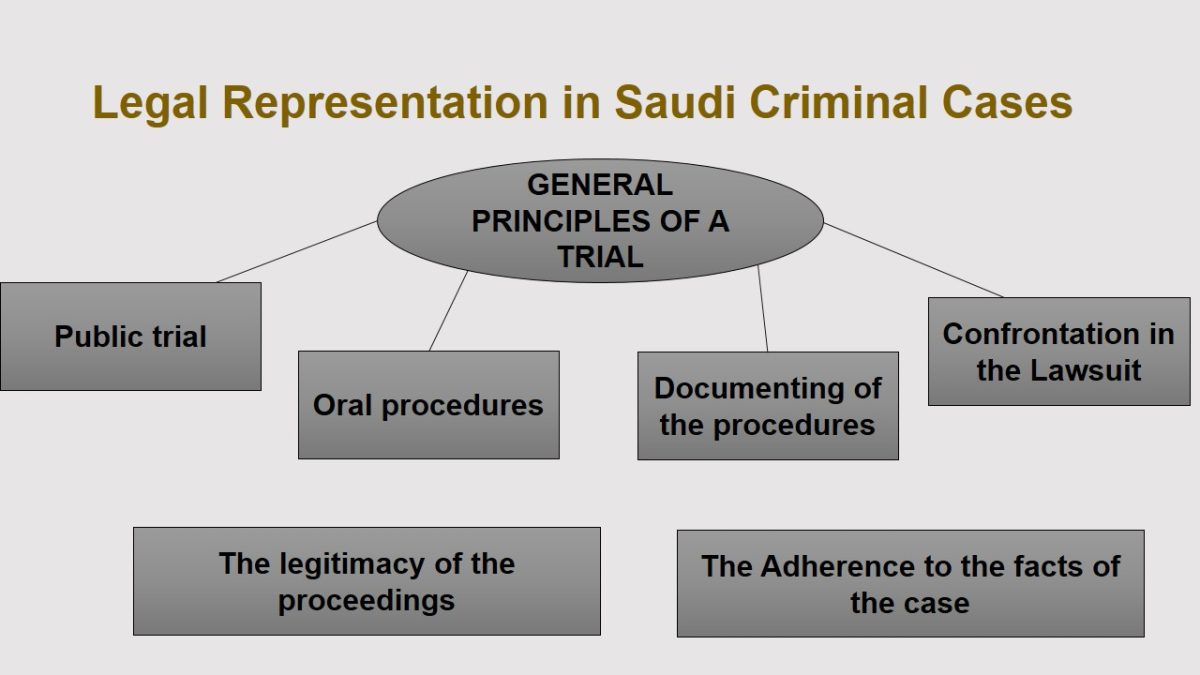
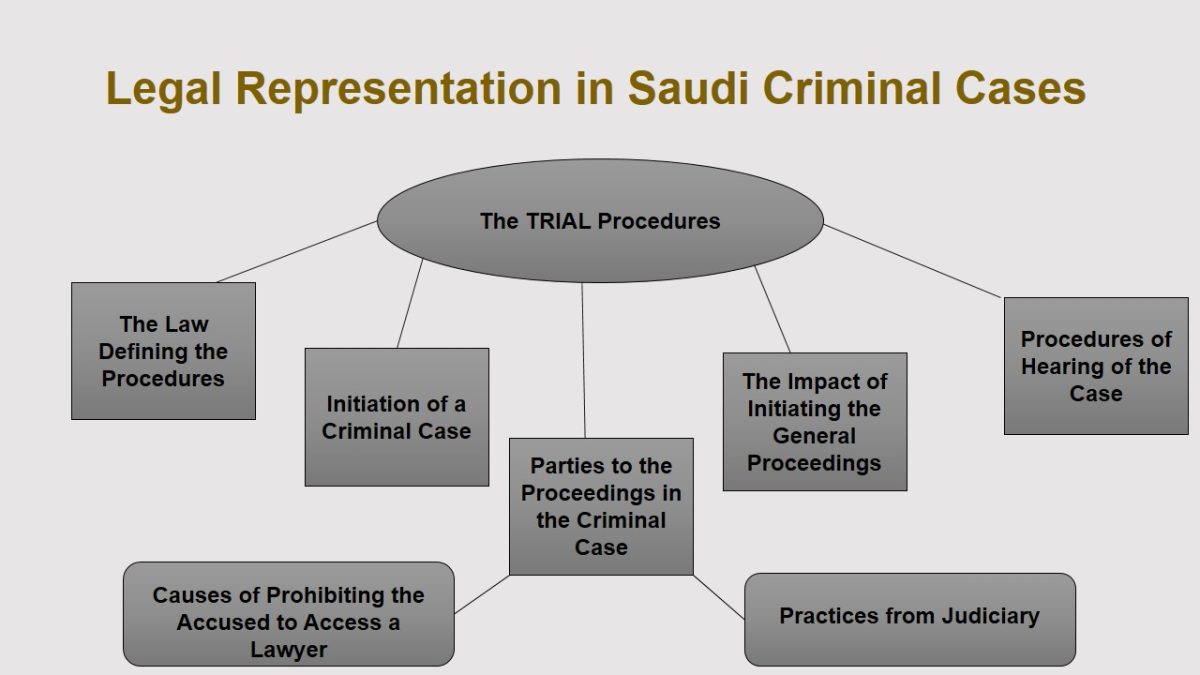
Hypotheses
The judicial system of the Kingdom of Saudi Arabia needs to be upgraded by reviewing the Code of Legal Practice and the Code of Criminal Procedure so that proper and professional legal representation may be granted to the accused individuals.
This is possible by adopting a Code of Legal Practice based on Sharaah and the Code of Criminal Procedure of other Sharaah-based judicial systems such as Egypt and Syria. These may act as models for the judiciary in the Kingdom.
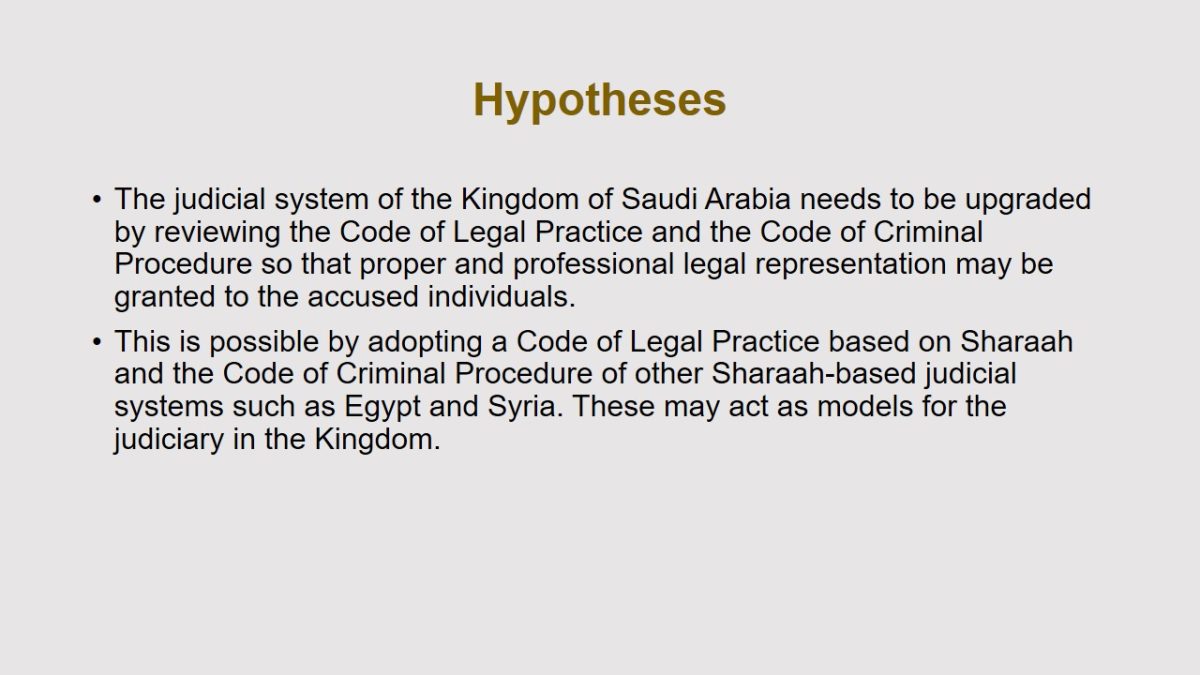
Scope and Limitations of the Study
The study delves on the following:
The jurisprudential analysis of the legal profession.
Examines the procedural law and its efficiency in connection with legal representation in the Kingdom of Saudi Arabia; this is studied in comparison with the situation of legal practice as it exists in Egypt and Syria. Thus, the study primarily focuses the Code of Legal Practice and the Code of Criminal Procedure in this regard.
However, it must be emphasized that the study does not discuss all the procedures which are carried out by lawyers; rather, it takes up the most significant ones that are fundamental to the practice of law. Overlooking these procedures may lead to grave situations where the very spirit of justice is challenged.
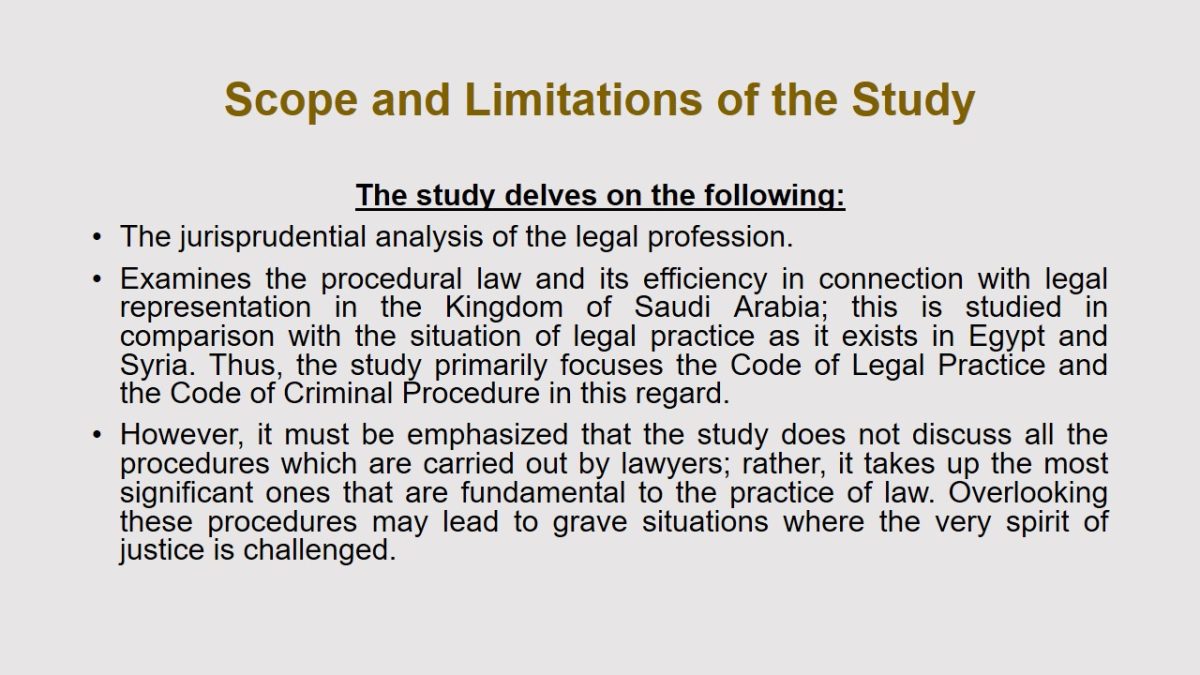
Research Methodology
- The research is comparative
- The sources of information include:
- state laws of other countries such as Egypt and Syria;
- case laws;
- Local and international reports;
- Islamic law textbooks;
- Law commentaries,
- Law journals;
- Law digests;
- Magazines;
- Newspapers;
- Online material.
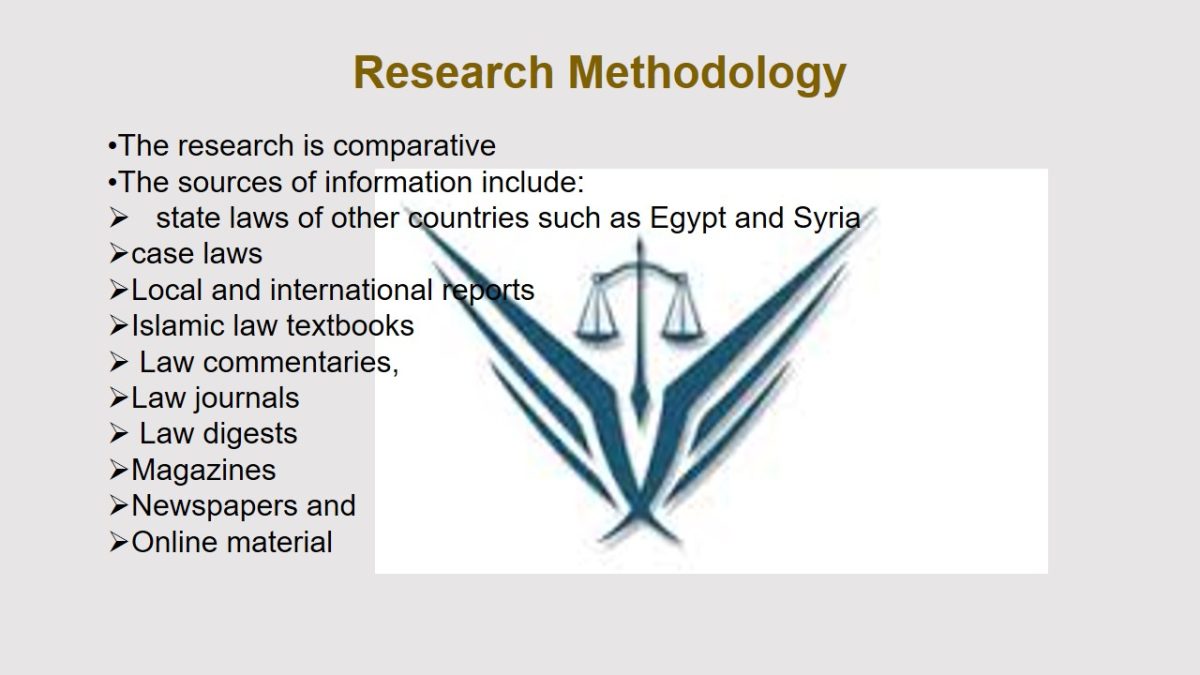
Findings
The study has revealed that Sharaah, Sunnah, and majority of Islamic scholars on Islamic jurisprudence concur on the permissibility of legal practice in Islam.
It has also been established that individuals without the requisite academic qualification are not in position to undertake or promote the task of legal representation in a proper and adequate manner.
In Saudi Arabia, there is no immunity for lawyers; therefore, the law does not recognise any features or privacy for them.
Saudi Code of Legal Practice and the Code of Criminal Procedure do not take up the access to a lawyer as mandatory for the defence of the accused unlike the laws in other countries like Egypt and Syria. Therefore, in Saudi law, everybody can plead before the law courts.
The study established that lawyers have critical role in the litigations; the Presence of the lawyer as independent party, will lead to:
- The guarantee that the accused are not exposed to torture or to the risks of intimidation and the use of ill-treatment.
- Achieve some equality between the accused and his opponent (the prosecutor) who is supported by all the state agencies.
The absence of a lawyer makes the trial a mock and being secret; its basis and sources will be from the case files and the incriminating evidence, which is submitted by the prosecutor.
Also, the absence of a lawyer results in inequities of the legal status between the accused and the public prosecutor.
Both the investigating and judicial authorities take legal provisions as regulatory texts. This is true especially in cases where nullity of procedures does not follow a violation (on the part of these authorities). It explains why these texts have lost their significance with the consequence that their presence or absence means nothing
Criminal justice in the Kingdom of Saudi Arabia has many gaps. Legal articles, as shown in this study, are not without ambiguity and legislative shortcomings. What stands as one of the most prominent features of the system is the fact that it does not contain any clear and evident text that can be invoked to reinforce the commitment to what is stated in the law
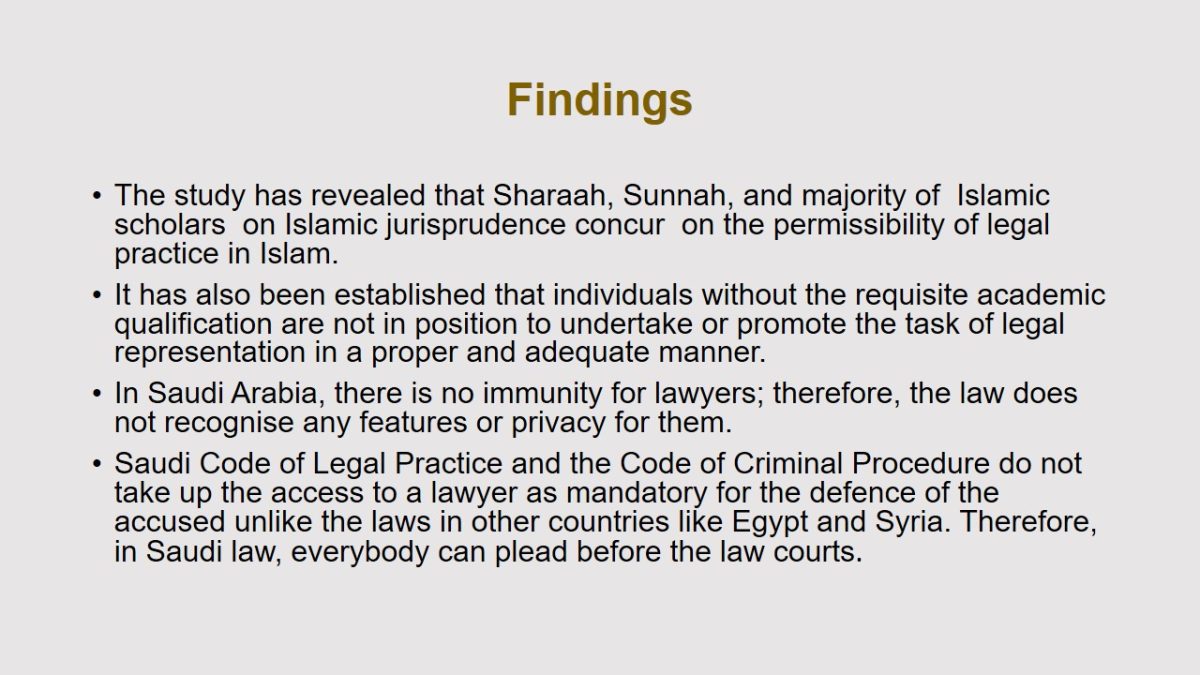
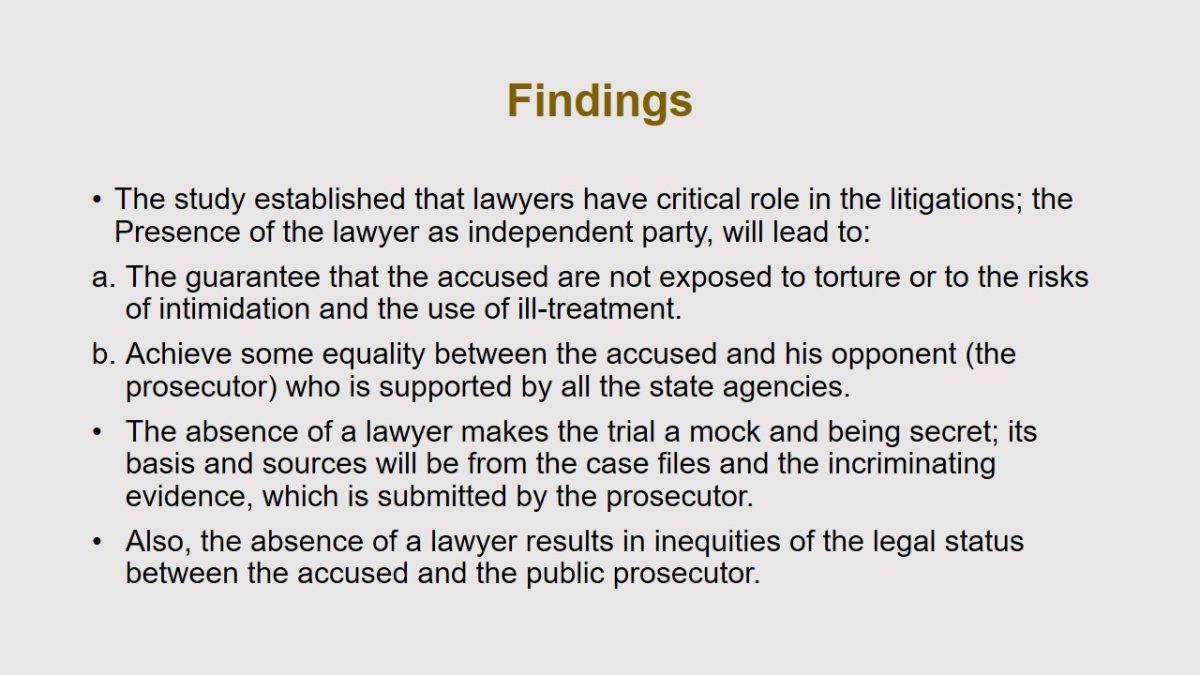
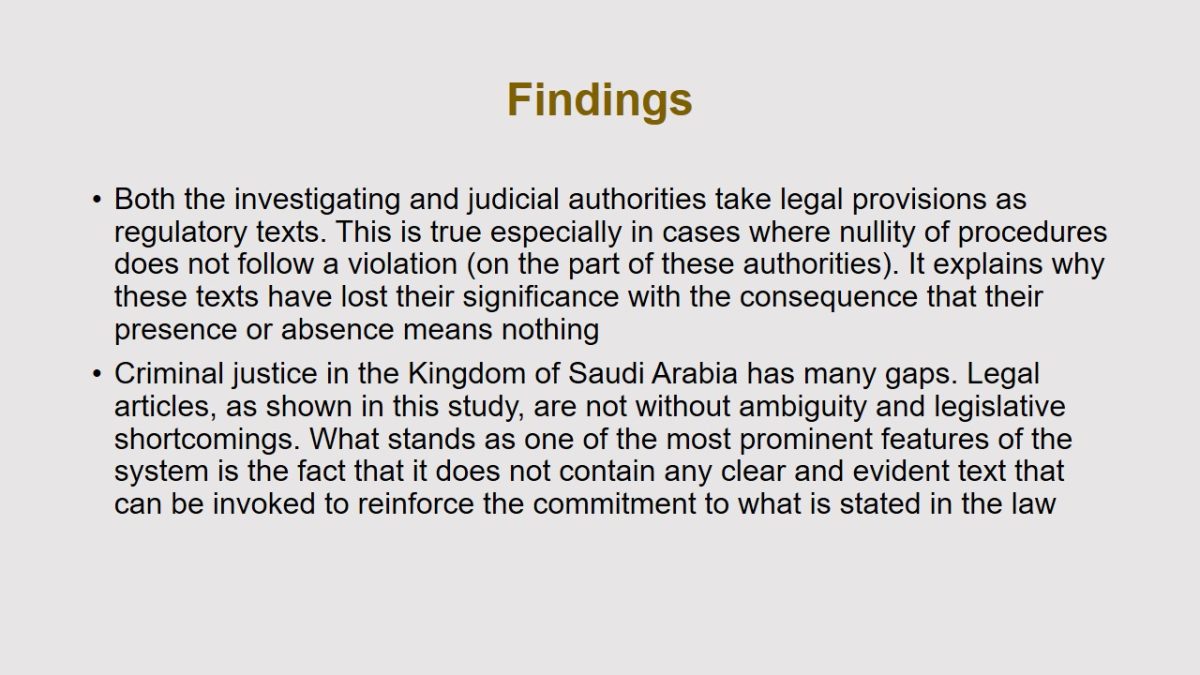
Conclusion of the findings
From the study:
- It is clear that the evidence and clues have a significant impact on the conviction of the judge regarding the accused being a perpetrator.
- The evidence and clues may be considered by some judges as valid reason for preventing the accused from accessing a lawyer.
- This owes to a judge’s belief that the defence presented by a lawyer will only blur the truth and rid the offender, and therefore, the judge does not allow the accused legal representation except in cases where there exists evidence of innocence of the accused.
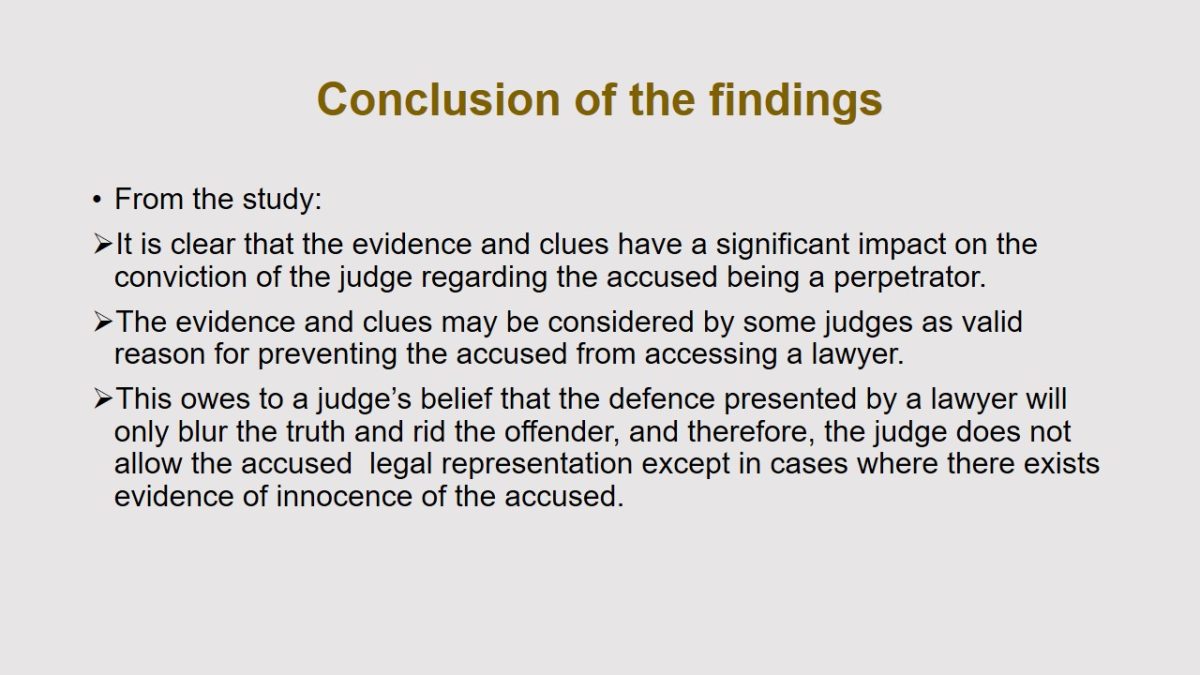
Recommendations
The findings on the role structure of the legal system in Saudi Arabia points to evidence of gaps that should be sealed in order to streamline the legal practice in the Kingdom. As such, the following measures should be taken.
Review the provisions and articles of the Code of Criminal Procedure, and the Code of Legal Practice to align them with similar legislations in Egyptian and Syrian Law; this will enhance rule of law and be enshrined in the texts and applied on the ground.
Completing specialised law study should be a requirement for being enrolled into the Saudi’s law practice; hence, there should be exclusive academic institutions for the preparation and training of lawyers.
Immunities should be created to cushion the legal practice itself to save it from becoming a practice for those who do not have any other job.
Adequate safeguards should be put in place to allow the lawyer to play their roles in the required manner by protecting them from the arbitrariness of the authorities, and establish the invalidity of any action taken against lawyers if it violates the terms and provisions of the law.
The Code of Legal Practice should approve of the accused’s right to access a lawyer during the inference stage since it leads to saving human dignity, paving the road to truth, and thereby ensuring the administration of justice in the subsequent stages of a criminal lawsuit.
The Saudi legislature should allow the accused to access a lawyer; also, it must take up the responsibility of providing legal assistance to the accused who does not afford getting a lawyer, i.e., right to state provided advocacy.
Saudi’s law should be designed to provide for inadmissibility of the use of evidence, which is obtained without the presence of a lawyer.
There should be enactment of a Penal Code to implement the principle of no crime and no punishment, but stipulated by a legal provision which serves as a great means of protection to the accused on one hand, and facilitates the job of the lawyer on the other.
The Code of Criminal Procedure should contain real guarantee (for the accused) on having access to a lawyer and not preventing the latter from communicating with detainees.
The court or any other authority should not be given the right to discredit a lawyer’s presence before a court on behalf of his client unless the lawyer loses his eligibility to be there in accordance with law.
The advisory opinion should not affect the drafting of the law or its enforcement. This is for it may act as a contradiction between Fiqh and the reality, the reality is that can reveal the suitability of the advisory opinion for the reality or not. The reality illustrates that a lawyer is necessary for defending an accused at all stages of litigation.
